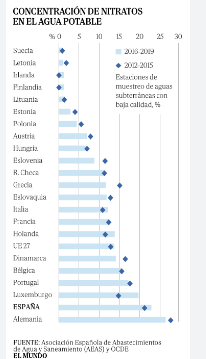Climate change threatens to rise water prices in Spain
The OECD warns that Spain has one of the lowest water price in Europe, a situation that does not match to its water scarcity. Farmers respond that it is "impossible" to assume a price increase. The UN rapporteur indicates that the first thing is to ensure adequate water governance in the country.

Spain is one of the countries in Europe with the cheapest water. This has been the case historically and continues to be so in spite of periods of shortages that are becoming more and more pronounced. Climate change and the lack of rainfall in more and more places for longer periods are once again putting the spotlight on the low cost of the bill: the OECD made this very clear in its extensive survey on the Spanish economy.

OECD Survey
"Drought associated with climate change and the expansion of cropland irrigation is having an impact on water availability and quality. Actions focused on water demand management should be promoted, improving water use efficiency through greater ecological reuse of water. The price of water should better reflect its scarcity, particularly for agricultural uses," states the OECD in the Economic Survey of Spain 2023.
It also highlights a serious problem: "Fertilizer pollution should be addressed through increased taxation and regulation". According to data collected by the OECD from the European Environment Agency, Spain is the country with the second highest concentration of nitrates in drinking groundwater (Fig. 1). Only Germany presents a higher figure than Spain, which, moreover, in the period 2012-2019 recorded an upturn with respect to the figures recorded between 2012 and 2015. The next countries with the worst data are Luxembourg and Portugal.

The bill that households pay for water
Although the OECD document is more oriented towards problems and prices in agricultural water use, the sectoral organization AEAS also recently pointed to the water bills paid by Spanish households. "The average price of water for domestic use in Spain is 1.97 €/m3 (excluding VAT). (Fig. 2) This price is far from covering the cost of services, contrary to the requirements set by the Water Framework Directive". "Spain has one of the lowest urban water tariffs (which includes domestic, industrial and commercial use) in Europe. We are 45% below the European average despite being one of the European countries with the greatest scarcity of water resource".

The consequences
But what would be the consequences of raising the price of the water bill?. "It is impossible to assume that," says Pedro Barato, president of the farmers' association Asaja. In his opinion, "we must start with other measures before addressing a possible increase in the price of water". "In the end what we are going to do is scare off investments and endanger the economy of an area," he complains.
The problem lies in the fact that irrigation is much more profitable than rainfed farming. According to data provided by Asaja, in Spain there are around 3.5 million hectares of irrigated land and 11.5 million of rainfed, however the value of the production of the first is much higher. According to Mr. Barato, "either water has a political price or it is impossible to develop agricultural activities". This is the case, for example, with desalinization, discarded by the OECD to solve the aforementioned problem of nitrates in aquifers. "It will work for a golf course, because it is profitable, but not for tomato cultivation," says Barato.
For this farmers' representative, the alternative is to dispose of nitrites and nitrates as is already being done, with circular economy solutions, such as biogas production. This could be complemented with the neglect of functions that he assures that exists with recycled water. "There are many more things that can be done than quickly raising the price of water".

The voice of the United Nations
For Pedro Arrojo, UN rapporteur for drinking water and sanitation rights, a price increase has several aspects. First, he points out the danger of passing the price increase on to the population. It would be "an attack on human rights, when water cuts are already occurring for thousands of vulnerable families”. Moreover, it would not be particularly efficient because domestic water "is not even 10% of the water consumed".
Irrigation accounts for 70-80%, but Mr. Arrojo also considers that it is important to make distinctions in this field. "The small farmer presents a weak economy that must maintain some support." In any case, Arrojo recalls that the problem of pollution and overexploitation of aquifers is greater and should be addressed before raising rates.
Barato and Arrojo agree in pointing out that something that the OECD values positively, the European funds earmarked for the digitalization of the water cycle in Spain, is not a panacea. "The fact that there are a million illegal wells is not because of a lack of technology, it's a lack of the courage to apply the law," says the UN rapporteur. “The problems of overexploitation, injustice, abuse and lack of sustainability are not solved with technology, but with proper governance”. This also includes losses in urban networks, which are estimated at 20-25%, "Reducing this percentage is cheaper than desalinating and you have solved the problem of scarcity," Arrojo asserts.
Source: El Mundo